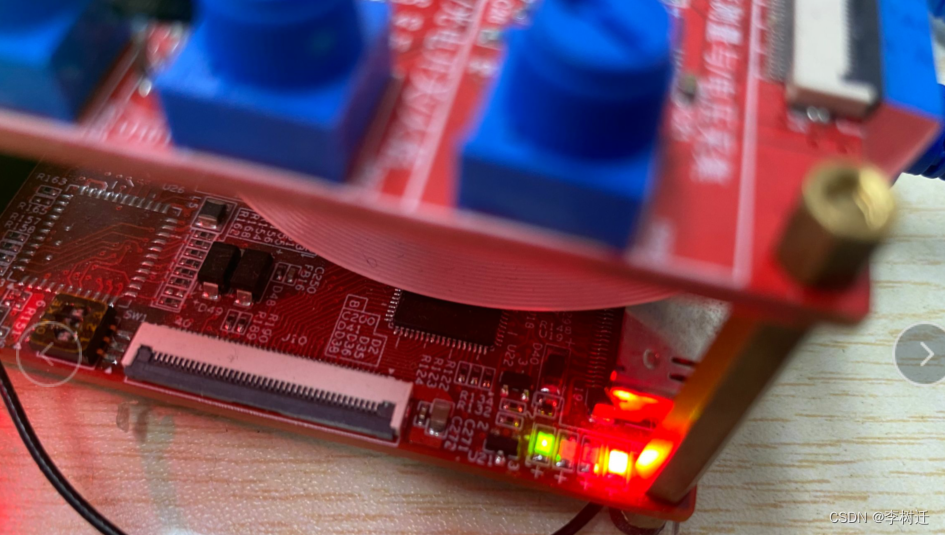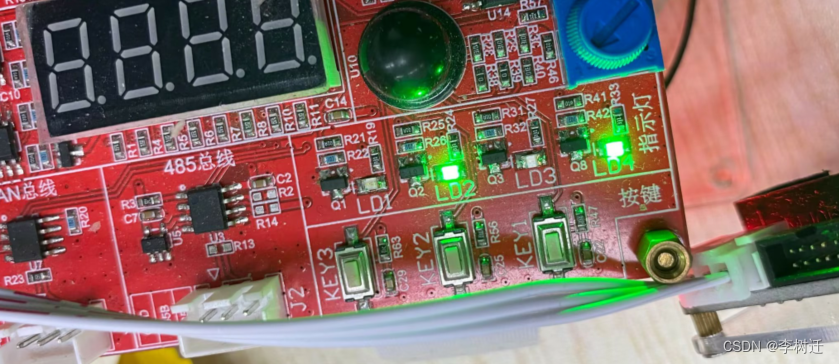通过字符设备驱动分布操作进行6个灯的操作(ioctl)
头文件:
#ifndef __MYLED_H__
#define __MYLED_H__
typedef struct {
volatile unsigned int MODER; // 0x00
volatile unsigned int OTYPER; // 0x04
volatile unsigned int OSPEEDR; // 0x08
volatile unsigned int PUPDR; // 0x0C
volatile unsigned int IDR; // 0x10
volatile unsigned int ODR; // 0x14
volatile unsigned int BSRR; // 0x18
volatile unsigned int LCKR; // 0x1C
volatile unsigned int AFRL; // 0x20
volatile unsigned int AFRH; // 0x24
volatile unsigned int BRR; // 0x28
volatile unsigned int res;
volatile unsigned int SECCFGR; // 0x30
}gpio_t;
//GPIOE基地址
#define PHY_GPIOE_ADDR 0x50006000
#define PHY_GPIOF_ADDR 0x50007000
#define PHY_GPIOZ_ADDR 0x54004000
//RCC基地址:0x50000A28
#define PHY_RCC_LED1 0x50000A28
#define PHY_RCC_LED4 0x50000210
#define LED_ON _IOW('a',1,int)
#define LED_OFF _IOW('a',0,int)
enum{
LED1,
LED2,
LED3,
LED4,
LED5,
LED6,
};
#endif内核文件:
#include <linux/init.h>
#include <linux/module.h>
#include <linux/cdev.h>
#include<linux/fs.h>
#include<linux/uaccess.h>
#include<linux/slab.h>
#include <linux/io.h>
#include "mydev.h"
#define CNAME "myled"
char kbuf[128] = {0};
gpio_t* virt_gpioe = NULL;
gpio_t* virt_gpiof = NULL;
gpio_t* virt_gpioz = NULL;
unsigned int* virt_rcc = NULL;
unsigned int* virt_rcc4 = NULL;
struct cdev *cdev;
dev_t devno;
unsigned int minor=0;
#define LED1_ON (virt_gpioe->ODR |= (0x1 << 10))
#define LED1_OFF (virt_gpioe->ODR &= (~(0x1 << 10)))
#define LED2_ON (virt_gpiof->ODR |= (0x1 << 10))
#define LED2_OFF (virt_gpiof->ODR &= (~(0x1 << 10)))
#define LED3_ON (virt_gpioe->ODR |= (0x1 << 8))
#define LED3_OFF (virt_gpioe->ODR &= (~(0x1 << 8)))
#define LED4_ON (virt_gpioz->ODR |= (0x1 << 5))
#define LED4_OFF (virt_gpioz->ODR &= (~(0x1 << 5)))
#define LED5_ON (virt_gpioz->ODR |= (0x1 << 6))
#define LED5_OFF (virt_gpioz->ODR &= (~(0x1 << 6)))
#define LED6_ON (virt_gpioz->ODR |= (0x1 << 7))
#define LED6_OFF (virt_gpioz->ODR &= (~(0x1 << 7)))
#if 0
unsigned int major =0;//动态申请主设备号
#else
unsigned int major=500;//静态态指定主设备号
#endif
struct class *cls;
struct device *dev;
//open
int mycdev_open(struct inode *inode, struct file *file)
{
printk("%s:%s:%d\n",__FILE__,__func__,__LINE__);
return 0;
}
//read
ssize_t mycdev_read(struct file *file, char *ubuf, size_t size, loff_t *off)
{
printk("%s:%s:%d\n",__FILE__,__func__,__LINE__);
return 0;
}
//write
ssize_t mycdev_write(struct file *file, const char *ubuf, size_t size, loff_t *off)
{
printk("%s:%s:%d\n",__FILE__,__func__,__LINE__);
return 0;
}
//close
int mycdev_close(struct inode *inode, struct file *file)
{
printk("%s:%s:%d\n",__FILE__,__func__,__LINE__);
return 0;
}
long myled_ioctl (struct file *file, unsigned int cmd, unsigned long args)
{
//1.判断cmd switch(cmd)
//2.判断操作哪盏灯进行点亮 copy_from_user
int whitch;
int ret;
switch(cmd)
{
case LED_ON:
ret = copy_from_user(&whitch,(void*)args,sizeof(int));
if(ret)
{
printk("copy from user is error\n");
return -EIO;
}
switch (whitch)
{
case LED1:
LED1_ON;
break;
case LED2:
LED2_ON;
break;
case LED3:
LED3_ON;
break;
case LED4:
LED4_ON;
break;
case LED5:
LED5_ON;
break;
case LED6:
LED6_ON;
break;
}
break;
case LED_OFF:
ret = copy_from_user(&whitch,(void*)args,sizeof(int));
if(ret)
{
printk("copy from user is error\n");
return -EIO;
}
switch (whitch)
{
case LED1:
LED1_OFF;
break;
case LED2:
LED2_OFF;
break;
case LED3:
LED3_OFF;
break;
case LED4:
LED4_OFF;
break;
case LED5:
LED5_OFF;
break;
case LED6:
LED6_OFF;
break;
}
break;
}
return 0;
}
struct file_operations fops=
{
.open=mycdev_open,
.read=mycdev_read,
.write=mycdev_write,
.release=mycdev_close,
.unlocked_ioctl = myled_ioctl,
};
static int __init mycdev_init(void)
{
int ret,i;
// 1.分配对象
cdev =cdev_alloc();
if(cdev==NULL)
{
printk("分配对象失败\n");
return -ENOMEM;
goto ERR1;
}
printk("分配对象空间成功\n");
//2.对象初始化
cdev_init(cdev,&fops);
//3.设备资源的申请(设备号)
if(major==0)//动态申请
{
ret=alloc_chrdev_region(&devno,minor,6,"myled");
if(ret)
{
printk("动态申请设备号失败\n");
goto ERR2;
}
major=MAJOR(devno);//获取主设备号
minor=MINOR(devno);//获取次设备号
}
else if(major>0)//静态指定主设备号
{
ret=register_chrdev_region(MKDEV(major,minor),6,"myled");
if(ret)
{
printk("静态申请设备号失败\n");
goto ERR2;
}
}
//4.注册
ret=cdev_add(cdev,MKDEV(major,minor),6);
if(ret)
{
printk("驱动对象注册进内核失败\n");
goto ERR3;
}
printk("驱动对象注册进内核成功\n");
//5.向上提交目录
cls=class_create(THIS_MODULE,"mycdev");
if(IS_ERR(cls))
{
printk("向上提交目录失败\n");
goto ERR4;
}
printk("向上提交目录成功\n");
//6.向上提交设备节点信息
for(i=0;i<6;i++)
{
dev=device_create(cls,NULL,MKDEV(major,i),NULL,"mycdev%d",i);
if(IS_ERR(dev))
{
printk("向上提交节点信息失败\n");
goto ERR5;
}
}
printk("向上提交设备节点成功\n");
//执行led操作
//4.将物理地址映射为虚拟地址
//4.1 将rcc地址映射
virt_rcc = ioremap(PHY_RCC_LED1,4);
if(virt_rcc == NULL)
{
printk("rcc ioremap is error\n");
return -ENOMEM;
}
virt_rcc4 = ioremap(PHY_RCC_LED4,4);
if(virt_rcc4 == NULL)
{
printk("rcc4 ioremap is error\n");
return -ENOMEM;
}
//映射GPIOE地址
virt_gpioe = ioremap(PHY_GPIOE_ADDR,sizeof(gpio_t));
if(virt_gpioe== NULL)
{
printk("virt_gpioe ioremap is error\n");
return -ENOMEM;
}
//映射GPIOF地址
virt_gpiof = ioremap(PHY_GPIOF_ADDR,sizeof(gpio_t));
if(virt_gpiof== NULL)
{
printk("virt_gpiof ioremap is error\n");
return -ENOMEM;
}
//映射GPIOZ
virt_gpioz = ioremap(PHY_GPIOZ_ADDR,sizeof(gpio_t));
if(virt_gpioz== NULL)
{
printk("virt_gpiof ioremap is error\n");
return -ENOMEM;
}
//5.对led1---->PE10引脚初始化 对led3---->PE8引脚初始化
*virt_rcc |= (0x1 << 4);//5.1 使能GPIOE组时钟[4]=1
virt_gpioe->MODER &= (~(0x3 << 20));//5.2 设置PE10引脚为输出模式 [21:20] = 01
virt_gpioe->MODER |= (0x1 << 20);
virt_gpioe->ODR &= (~(0x1 << 10)); //5.3 设置PE10引脚输出低电平
//6. 对led2---->PF10引脚初始化
*virt_rcc |= (0x1 << 5);//5.1 使能GPIOF组时钟[5]=1
virt_gpiof->MODER &= (~(0x3 << 20));//5.2 设置PF10引脚为输出模式 [21:20] = 01
virt_gpiof->MODER |= (0x1 << 20);
virt_gpiof->ODR &= (~(0x1 << 10)); //5.3 设置PF10引脚输出低电平
//7.对led3---->PE8引脚初始化
virt_gpioe->MODER &= (~(0x3 << 16));//5.2 设置PE8引脚为输出模式 [17:16] = 01
virt_gpioe->MODER |= (0x1 << 16);
virt_gpioe->ODR &= (~(0x1 << 8)); //5.3 设置PE8引脚输出低电平
//8.对led4,led5,led6---->PZ5,PZ6,PZ7引脚初始化
virt_gpioz->MODER &= (~(0x3 << 10));//5.2 设置PE8引脚为输出模式 [17:16] = 01
virt_gpioz->MODER |= (0x1 << 10);
virt_gpioz->ODR &= (~(0x1 << 5)); //5.3 设置PE8引脚输出低电平
virt_gpioz->MODER &= (~(0x3 << 12));//5.2 设置PE8引脚为输出模式 [17:16] = 01
virt_gpioz->MODER |= (0x1 << 12);
virt_gpioz->ODR &= (~(0x1 << 6)); //5.3 设置PE8引脚输出低电平
virt_gpioz->MODER &= (~(0x3 << 14));//5.2 设置PE8引脚为输出模式 [17:16] = 01
virt_gpioz->MODER |= (0x1 << 14);
virt_gpioz->ODR &= (~(0x1 << 7)); //5.3 设置PE8引脚输出低电平
return 0;
ERR5:
//将前面提交成功的设备信息销毁
for(--i;i>=0;i--)
{
device_destroy(cls,MKDEV(major,i));
}
//销毁目录
class_destroy(cls);
ERR4:
cdev_del(cdev);
ERR3:
unregister_chrdev_region(MKDEV(major,minor),3);
ERR2:
kfree(cdev);
ERR1:
return ret;
}
static void __exit mycdev_exit(void)
{
int i;
/*
1.销毁设备节点
2.销毁目录
3.注销驱动对象
4.释放设备资源(s设备号)
5.释放对象空间
*/
//2.取消地址映射
iounmap(virt_rcc);
iounmap(virt_rcc4);
iounmap(virt_gpioe);
iounmap(virt_gpiof);
iounmap(virt_gpioz);
for(i=0;i<3;i++)
{
device_destroy(cls,MKDEV(major,i));
}
class_destroy(cls);
cdev_del(cdev);
unregister_chrdev_region(MKDEV(major,minor),3);
kfree(cdev);
}
module_init(mycdev_init);
module_exit(mycdev_exit);
MODULE_LICENSE("GPL");测试文件:
#include <stdio.h>
#include <sys/types.h>
#include <sys/stat.h>
#include <fcntl.h>
#include <unistd.h>
#include <errno.h>
#include <string.h>
#include <sys/ioctl.h>
#include "mydev.h"
int main(int argc,const char * argv[])
{
char buf[128] = {0};
int whitch;
int fd = -1;
fd = open("/dev/mycdev0",O_RDWR);
if(fd == -1)
{
perror("open is error\n");
return -1;
}
while(1)
{
whitch = LED1;
ioctl(fd,LED_ON,&whitch);
sleep(1);
ioctl(fd,LED_OFF,&whitch);
sleep(1);
whitch = LED2;
ioctl(fd,LED_ON,&whitch);
sleep(1);
ioctl(fd,LED_OFF,&whitch);
sleep(1);
whitch = LED3;
ioctl(fd,LED_ON,&whitch);
sleep(1);
ioctl(fd,LED_OFF,&whitch);
sleep(1);
whitch = LED4;
ioctl(fd,LED_ON,&whitch);
sleep(1);
ioctl(fd,LED_OFF,&whitch);
sleep(1);
whitch = LED5;
ioctl(fd,LED_ON,&whitch);
sleep(1);
ioctl(fd,LED_OFF,&whitch);
sleep(1);
whitch = LED6;
ioctl(fd,LED_ON,&whitch);
sleep(1);
ioctl(fd,LED_OFF,&whitch);
sleep(1);
}
close(fd);
return 0;
}工程管理文件:
ARCH ?=x86
modname ?= mydev
ifeq ($(ARCH),arm)
#定义一个变量,存放linux内核源码目录,arm架构
KERNEDIR:=/home/ubuntu/linux-5.10.61
#x86架构
else
KERNEDIR:=/lib/modules/$(shell uname -r)/build
#定义一个变量,开启一个终端,执行pwd命令
endif
PWD:=$(shell pwd)
all:
@#-C:跳转到内核顶层目录下,读取内核顶层目录下的Makefile文件
@#在内核源码顶层目录下执行:make M=$(shell pwd) modules
@#M=$(shell pwd):回到当前目录下,只编译当前目录下的文件
@#make modules:采用模块化方式进行编译
make -C $(KERNEDIR) M=$(shell pwd) modules
clean:
make -C $(KERNEDIR) M=$(shell pwd) clean
#指定模块化方式编译的文件
obj-m:=$(modname).o运行效果:

